嵌入式Linux C进程间通信(三)——消息队列
文章目录
前述
System V IPC

特点:
与管道有所不同,它完全使用了不同的实现机制,与文件没任何的关系,也就是说内核不再以文件的形式来管理System V IPC
System V IPC不再以文件的形式存在,因此没有文件描述符这个东西,但是它有类似的“标识符”
任何进程之间通信时,都可以使用System V IPC来通信
POSIX也可以支持消息队列、共享内存、信号量能在unix下运行
一、消息队列的创建和删除
消息队列的本质就是由内核创建的用于存放消息的链表,由于是存放消息的,所以我们就把这个链表称为消息队列。
1.1 消息的组成
- 消息编号:识别信息用
- 消息正文:真正的信息内容
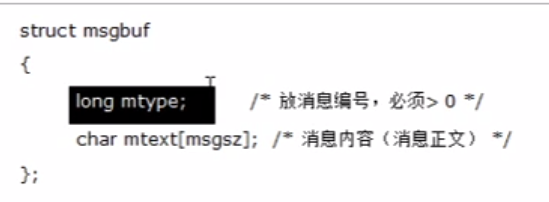
1.2 创建
int msgget(key_t key, int msgflg);
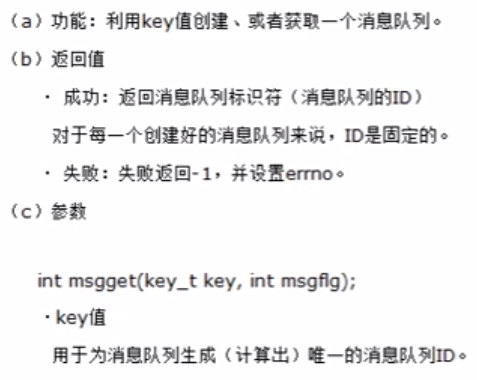
使用ftok生成key值

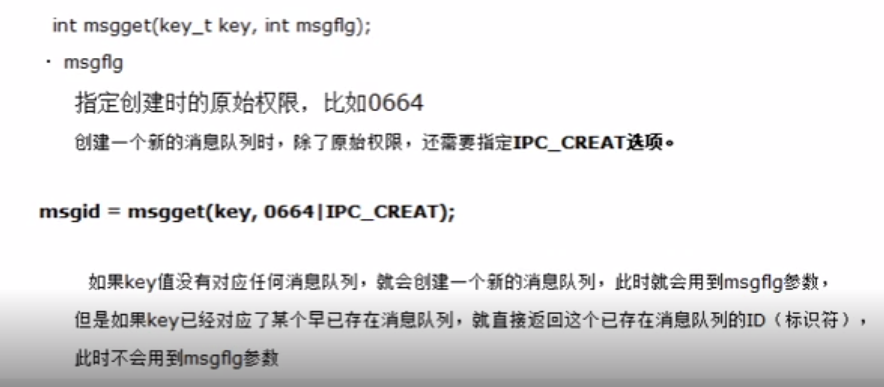
1.2 查看系统的消息队列

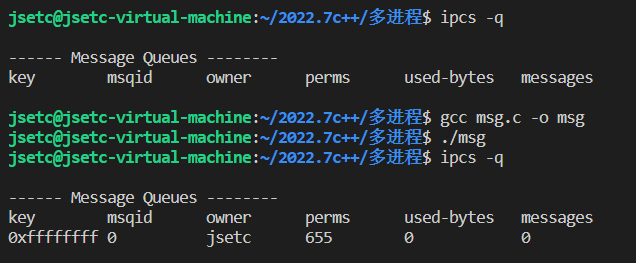
1.3 消息队列的创建
#include <stdio.h>
#include <sys/types.h>
#include <sys/ipc.h>
#include <sys/msg.h>
#include <stdlib.h>
#include <errno.h>
#define MSGNAME "./msg_file"
int main(int argc, char const *argv[])
{
key_t key;
int msgid;
key = ftok(MSGNAME, 'k');
msgid = msgget(key, IPC_CREAT | 0655);
if (msgid < 0)
{
perror("msgid error!");
exit(1);
}
printf("msgid = %d\n",msgid);
return 0;
}
1.4 获取属性及删除
进程结束时,system v ipc不会自动删除,进程结束后,使用ipcs依然能够查看到
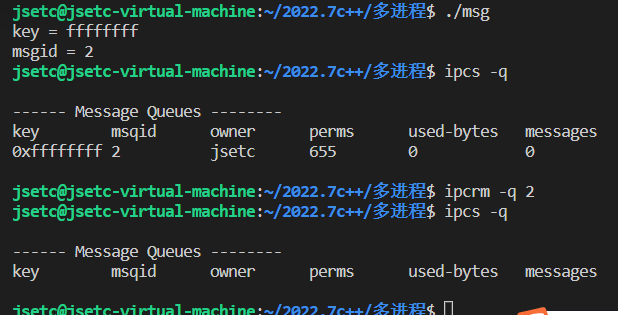
msgctl
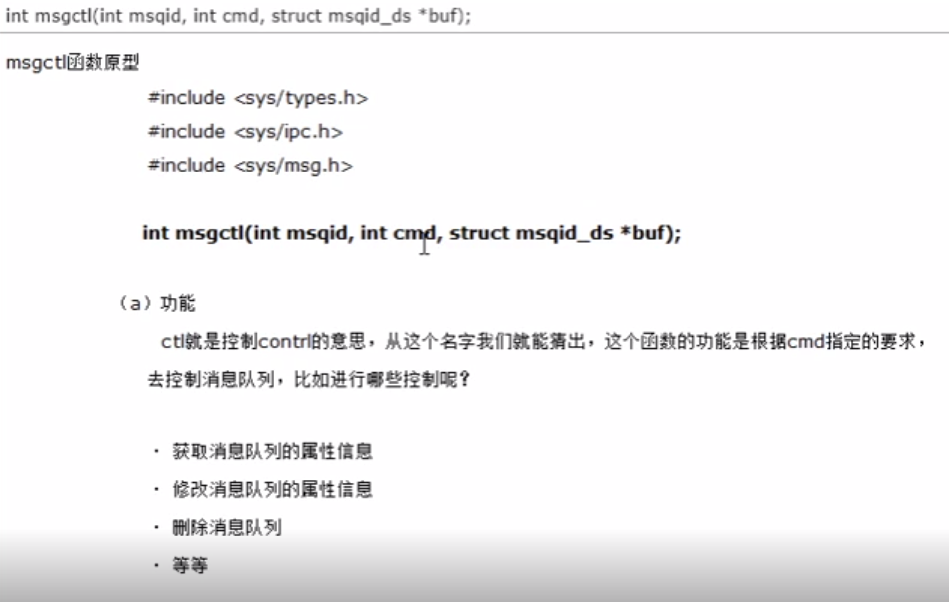
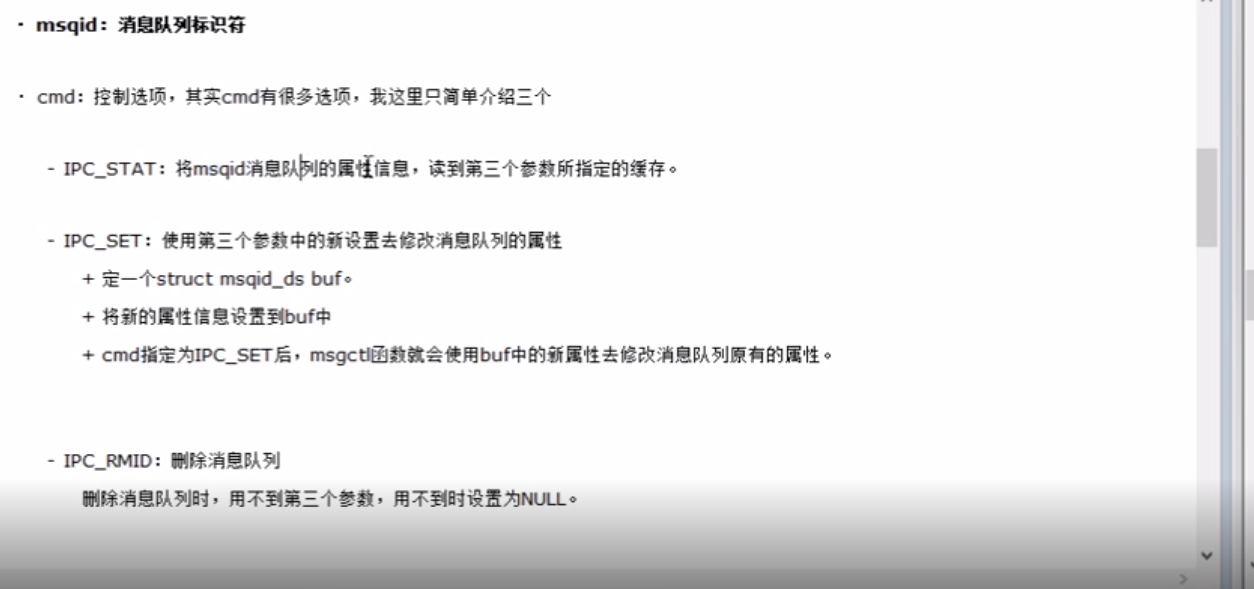


#include <stdio.h>
#include <sys/types.h>
#include <sys/ipc.h>
#include <sys/msg.h>
#include <stdlib.h>
#include <errno.h>
#define MSGNAME "./msg_file"
int main(int argc, char const *argv[])
{
key_t key;
int msgid;
key = ftok(MSGNAME, 'k');
msgid = msgget(key, IPC_CREAT | 0655);
if (msgid < 0)
{
perror("msgid error!");
exit(1);
}
printf("key = %x\n", key);
printf("msgid = %d\n", msgid);
msgctl(msgid,IPC_RMID,NULL);
return 0;
}

二、消息队列的发送和接收
2.1 发送
int msgsnd(int msqid,const void *msgp, size_t msgsz,int msgflg);

2.2 接收
ssize_ t msgrcv(int msqid, void *msgp, size_ t msgsz, long msgtyp, int msgflg);
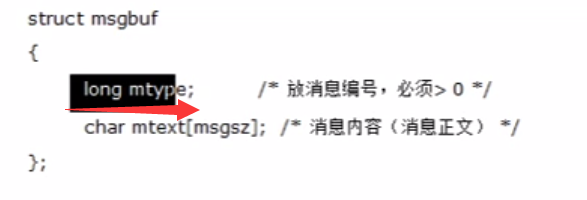
#include <stdio.h>
#include <sys/types.h>
#include <sys/ipc.h>
#include <sys/msg.h>
#include <stdlib.h>
#include <errno.h>
#include <unistd.h>
#include <string.h>
#include <signal.h>
#define MSGNAME "./msg_file"
int msgid;
struct msgbuf
{
long mtype;
char mtext[1024];
};
void my_exit(int msg)
{
msgctl(msgid,IPC_RMID,NULL);
}
int main(int argc, char const *argv[])
{
key_t key;
pid_t pid;
signal(SIGINT, my_exit);
key = ftok(MSGNAME, 'k');
msgid = msgget(key, IPC_CREAT | 0655);
if (msgid < 0)
{
perror("msgid error!");
exit(1);
}
printf("key = %x\n", key);
printf("msgid = %d\n", msgid);
pid = fork();
if (pid < 0)
{
perror("fork perror!\n");
exit(1);
}
if (pid == 0)
{
long mtype;
char buffer[1024];
struct msgbuf pmsgbuf;
while (1)
{
memset(buffer, 0, sizeof(buffer));
memset(&pmsgbuf, 0, sizeof(struct msgbuf));
printf("Please input send msg:\n");
scanf("%s", buffer);
strcpy(pmsgbuf.mtext, buffer);
printf("Please input send msg id:\n");
scanf("%ld", &mtype);
pmsgbuf.mtype = mtype;
if(msgsnd(msgid,(void *)&pmsgbuf,sizeof(pmsgbuf),IPC_NOWAIT) < 0)
{
perror("msg snd error!");
exit(1);
}
}
}
else if(pid > 0)
{
size_t size;
long mtype;
char buffer[1024];
struct msgbuf pmsgbuf;
while (1)
{
memset(buffer, 0, sizeof(buffer));
memset(&pmsgbuf, 0, sizeof(struct msgbuf));
size = msgrcv(msgid, &pmsgbuf,sizeof(pmsgbuf),3,0);
if (size < 0)
{
perror("msg rcv error!");
exit(1);
}
printf("recv data:%s\n", pmsgbuf.mtext);
sleep(1);
}
}
return 0;
}

三、任意进程通信及特点
多个进程是如何共享到同一个消息队列?
- fork前创建
- 创建者把ID保存到某文件,共享进程读出ID即可+
- 使用ftok函数,利用与创建者相同的“路径名”和8位整形数,生成相同的key值
消息队列的特点
- 传送有格式的消息流
- 多进程网状旁叉通信时,消息队列是上上之选
- 能实现大规模数据的通信
3.1 msg_read.c
#include <stdio.h>
#include <sys/types.h>
#include <sys/ipc.h>
#include <sys/msg.h>
#include <stdlib.h>
#include <errno.h>
#include <unistd.h>
#include <string.h>
#include <signal.h>
#define MSGNAME "./msg_file"
struct msgbuf
{
long mtype;
char mtext[1024];
};
int main(int argc, char const *argv[])
{
key_t key;
key = ftok(MSGNAME, 'k');
int msgid = msgget(key, IPC_CREAT | 0777);
if (msgid < 0)
{
perror("msgid error!");
exit(1);
}
printf("key = %x\n", key);
printf("msgid = %d\n", msgid);
size_t size;
long mtype;
char buffer[1024];
struct msgbuf pmsgbuf;
while (1)
{
memset(buffer, 0, sizeof(buffer));
memset(&pmsgbuf, 0, sizeof(struct msgbuf));
size = msgrcv(msgid, &pmsgbuf,sizeof(pmsgbuf),3,0);
if (size < 0)
{
perror("msg rcv error!");
exit(1);
}
printf("recv data:%s\n", pmsgbuf.mtext);
sleep(1);
}
}
3.2 msg_write.c
#include <stdio.h>
#include <sys/types.h>
#include <sys/ipc.h>
#include <sys/msg.h>
#include <stdlib.h>
#include <errno.h>
#include <unistd.h>
#include <string.h>
#include <signal.h>
#define MSGNAME "./msg_file"
struct msgbuf
{
long mtype;
char mtext[1024];
};
int main(int argc, char const *argv[])
{
key_t key;
key = ftok(MSGNAME, 'k');
int msgid = msgget(key, 0777 | IPC_CREAT);
if (msgid < 0)
{
perror("msgid error!");
exit(1);
}
printf("key = %x\n", key);
printf("msgid = %d\n", msgid);
size_t size;
long mtype;
char buffer[1024];
struct msgbuf pmsgbuf;
while (1)
{
memset(buffer, 0, sizeof(buffer));
memset(&pmsgbuf, 0, sizeof(struct msgbuf));
printf("Please input send msg:\n");
scanf("%s", buffer);
strcpy(pmsgbuf.mtext, buffer);
printf("Please input send msg id:\n");
scanf("%ld", &mtype);
pmsgbuf.mtype = mtype;
if(msgsnd(msgid,(void *)&pmsgbuf,sizeof(pmsgbuf),IPC_NOWAIT) < 0)
{
perror("msg snd error!");
exit(1);
}
}
}
3.3 成果展示

分类:
嵌入式Linux C进程间通信




【推荐】国内首个AI IDE,深度理解中文开发场景,立即下载体验Trae
【推荐】编程新体验,更懂你的AI,立即体验豆包MarsCode编程助手
【推荐】抖音旗下AI助手豆包,你的智能百科全书,全免费不限次数
【推荐】轻量又高性能的 SSH 工具 IShell:AI 加持,快人一步
· winform 绘制太阳,地球,月球 运作规律
· 震惊!C++程序真的从main开始吗?99%的程序员都答错了
· AI与.NET技术实操系列(五):向量存储与相似性搜索在 .NET 中的实现
· 超详细:普通电脑也行Windows部署deepseek R1训练数据并当服务器共享给他人
· 【硬核科普】Trae如何「偷看」你的代码?零基础破解AI编程运行原理